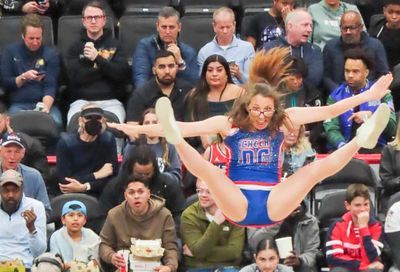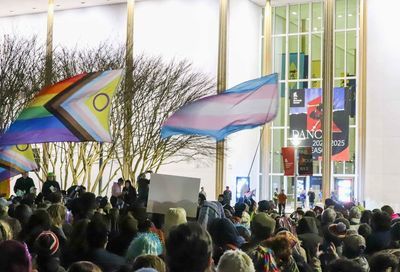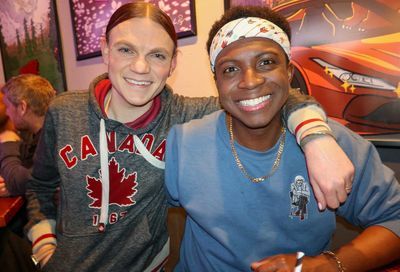GLAA Rates D.C. Special Election Candidates
Matthew Frumin gets top score, while others cluster close behind on LGBT issues
The Gay and Lesbian Activists Alliance (GLAA) of Washington, D.C., a nonpartisan, nonprofit political organization advocating for LGBT equality since 1971, released ratings Wednesday for candidates in the April 23 special election for an at-large seat on the D.C. Council.
GLAA President Richard Rosendall characterized most candidates’ overall scores – with candidates rated on a scale of -10 to 10 – as ”good” and ”decent.”
Advisory Neighborhood Commission 3E Commissioner Matthew Frumin, a Democrat, got the highest score of the seven candidates, earning a rating of 7. Incumbent Councilmember Anita Bonds (D-At Large) earned 6.5 and former Councilmember Michael A. Brown, a former independent now running as a Democrat, earned a 6. Democratic candidate Elissa Silverman and Statehood Green Party candidate Perry Redd both earned 5.5, and Republican Patrick Mara earned a rating of 5. Democrat Paul Zukerberg received a 2.
Ahead of ratings, GLAA sends candidates a questionnaire and a policy brief outlining issues important to the organization. Some of those issues include marriage and family, public health, public safety, human rights and defending LGBT consumers and businesses. Candidates are scored on four criteria: whether they agree with GLAA’s positions on various issues; content of their responses; their records on LGBT rights; and advocacy on behalf of the LGBT community.
At GLAA’s March 12 meeting, 11 members rated candidates’ questionnaire responses, also considering any background information about candidates knows to members, beyond what candidates may have submitted. Completed questionnaires from each of the seven ballot-listed candidates in the special election are available on GLAA’s website.
”The also-rans were weeded out,” Rosendall said, referring to perennial fringe candidates with little organization, name recognition or campaign funding, who have in the past netted GLAA ratings of zero or less.
”On the other hand, we didn’t have ratings similar to Mendelson, Graham, Catania and Evans,” he said, naming councilmembers who have previously received top ratings from GLAA and have been proactive in pushing for pro-LGBT legislation during their terms in office.
Rosendall emphasized that the organization’s ratings are just that, and should not be mistaken for endorsements of any kind.
”We’re not trying to pick somebody. We’re trying to evaluate them on our issues,” Rosendall said during the rating meeting, noting that the group’s rating system is exhaustive, making high scored hard to come by. ”We list our issues, we make our case in our policy briefs. … We’re very straightforward. Our purpose is not to play ‘gotcha.’ It’s to advance our agenda and communicate our policy concerns.”
Throughout Tuesday’s meeting, several GLAA members praised Frumin and Bonds, the top-rated candidates, for turning in detailed questionnaire answers. They also praised Silverman for her forward-looking response on the question of possible congressional action to rescind marriage equality in the District. Silverman answered that she would react to such a scenario by reintroducing a marriage-equality bill, even if voters chose to overturn existing marriage rights via congressionally forced referendum.
Brown and Mara did best with regard to their records on advocating for LGBT rights in the District, with members crediting Brown for votes while on the Council, and Mara for lobbying congressional Republicans not to interfere with local D.C. matters.
But GLAA members were also painstakingly critical of each candidate, scrutinizing responses considered insufficient. Several took issue with candidates appearing to hedge in their answers with regard to staking out potentially unpopular positions – particularly issues related to police interactions with the LGBT community and liquor licensing. Mara, for example, was singled out for two questions – regarding liquor licensing and whether the director of the Office of Human Rights should be required to have training and experience in civil rights enforcement – where members said his answers fell short of committing to GLAA’s agenda. The group also highlighted a question of voucher programs being used to fund students in religious schools that are exempted from having to comply with the D.C. Human Rights Act, in which Mara disagreed outright with GLAA’s position.
At other points during the March 12 meeting, GLAA members took aim at Brown for submitting what one referred to as the ”fool’s gold standard” of questionnaire responses. For his questionnaire submission for the April 23 special election, Brown resubmitted his 2012 re-election questionnaire and, by hand, answered new questions, and crossed out expired ones not appearing in GLAA’s 2013 questionnaire, though its appearance alone did not affect Brown’s rating.
”He didn’t appear to spend a lot of time on it,” Rosendall said Wednesday when asked about Brown’s questionnaire. ”He could have done better if he had.” Rosendall noted that when he served on the D.C. Council, Brown was a reliable vote for GLAA’s priorities. He added, however, that it seemed Brown was not taking the election process as seriously as the other candidates.
Other GLAA members questioned whether Bonds, a longtime behind-the-scenes fixture in Democratic politics, former advisor to then-Mayor Marion Barry (D-Ward 8) and chairwoman of the D.C. State Democratic Party, had overstated or exaggerated her role in promoting and advancing pro-LGBT legislation, though they were impressed with the content of her answers on various issues.
”Most of her record is cronyism and corruption, but that’s not her gay record,” ANC 3F commissioner and past president of GLAA Bob Summersgill said, even as he conceded that Bonds’s position on the issues was largely in line with GLAA’s priorities. ”And you can quote me on that.”
Representatives at both Bonds’s D.C. Council office and her campaign office declined to respond to Summersgill’s characterization.
Speaking with Metro Weekly, Frumin, as GLAA’s top-rated candidate, said he had reached out to people in the LGBT community to learn about their issues, some of which he was unfamiliar prior to his campaign.
”It’s not that others are not good,” Frumin said. ”What I bring, in the places I’ve operated, is a tone and an approach that leads to achieving results and getting things done. … I sometimes take unpopular positions and stand up for ideas, such as rights for returning citizens. … I think I would play a similar role on LGBT issues.”
[Editor’s notes: 1) Richard Rosendall’s opinion column appears regularly in Metro Weekly. 2) March 14, 4:45 p.m. This story was updated to reflect that Councilmember Bonds’s campaign office responded to a request for comment.]
Support Metro Weekly’s Journalism
These are challenging times for news organizations. And yet it’s crucial we stay active and provide vital resources and information to both our local readers and the world. So won’t you please take a moment and consider supporting Metro Weekly with a membership? For as little as $5 a month, you can help ensure Metro Weekly magazine and MetroWeekly.com remain free, viable resources as we provide the best, most diverse, culturally-resonant LGBTQ coverage in both the D.C. region and around the world. Memberships come with exclusive perks and discounts, your own personal digital delivery of each week’s magazine (and an archive), access to our Member's Lounge when it launches this fall, and exclusive members-only items like Metro Weekly Membership Mugs and Tote Bags! Check out all our membership levels here and please join us today!






















